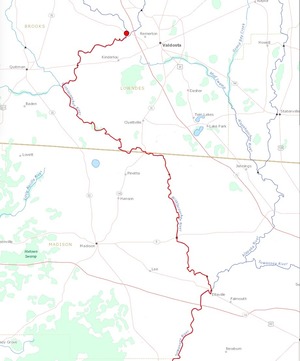Enteric bacteria have been confirmed in the Withlacoochee River,
and in the Suwannee River downstream of the confluence,
 say SRWMD and FDEP, while there’s
still no update on the City of Valdosta website
about
the 2.2 million gallons of sewage
Valdosta leaked into the Withlacoochee River and didn’t tell the public about for two days.
say SRWMD and FDEP, while there’s
still no update on the City of Valdosta website
about
the 2.2 million gallons of sewage
Valdosta leaked into the Withlacoochee River and didn’t tell the public about for two days.
Valdosta wasn’t the only city to spill into the Withlacoochee during the recent storms.
Tifton did, too,
but Valdosta’s spill was more than 230 times bigger than Tifton’s.
And city sewage is not the only source of contamination in the rivers:
wildlife, agricultural animals, and septic tanks add to it.
Baseline monitoring would help disentangle which is which.
But nobody is going to believe this contamination this time
came from any place but Valdosta.
SRWMD, News Flash, 2017-01-26 (no time given),
Health Officials Confirm Wastewater Contamination In The Withlacoochee And Suwannee Rivers,
Madison, Fla. — The Florida Department of Health in Hamilton,
Madison and Suwannee today issued a joint health advisory extending
the previous advisory for the Withlacoochee River to include a
portion of the Suwannee River. The health advisory is now in effect
for residents and visitors on the Withlachoochee River and on a
portion of the Suwannee River from the point where the two rivers
meet, downstream along the border of Madison and Suwannee County to
the Lafayette County line just above Dowling Park. The river waters
are not safe for contact during recreational use at this time.
Test results from the Florida Department of Environmental Protection
water sampling in the area have confirmed high levels of enteric
bacteria possibly due to a large spill of untreated sewage reported
by the City of Valdosta, Georgia.
People are urged to avoid contact with water in the Withlacoochee
River and the impacted areas of the Suwannee River. Water
contaminated with wastewater overflow presents several health risks
to humans. Untreated human sewage with microbes can cause
gastrointestinal issues, disease, infections or rashes.
Anyone who comes in contact with the river water should wash
thoroughly, especially hands, and before eating and drinking.
Children and older adults, as well as people with weakened immune
systems, are particularly vulnerable to disease so every precaution
should be taken to avoid contact with river water.
Additional sampling will take place to determine when the river
water is safe for recreational use.
Individuals with questions about the spillage should contact
Valdosta Environmental Manager Scott Fowler at 229-259-3592 or by
email at sfowler@valdostacity.com.
Individual with questions for Florida DEP should contact wastewater
coordinator Jim Mayer at the NE District office in Jacksonville at
904-256-1700.
-jsq, John S. Quarterman, Suwannee RIVERKEEPER®
You can join this fun and work by becoming a WWALS member today!












